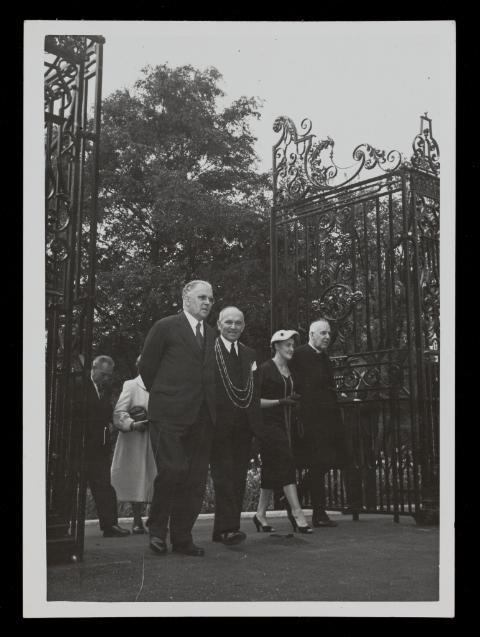Borthwick Newsletter - November 2023
Posted on 30 October 2023
November in the Archives - delve into our catalogues with this month’s featured description
Form of Service for the funeral of the Duke of Wellington at St Paul's Cathedral,18 November 1852 [Musgrave Papers, MUSG/7/2]
What’s new?
The 16th November sees the start of Disability History Month and to mark the occasion we are very pleased to be launching our updated and expanded Disability History Research Guide. The guide is the result of new research by intern Andrew Hill, who was recruited to develop the guide over the course of six weeks, working with a wide range of Borthwick archives so that the finished guide might better reflect what we hold and what those records tell us about the lives of people living with disabilities.
-369x502.jpg)
The project builds on previous work to augment and expand our Women’s History and LGBTQ+ History research guides, and is part of our ongoing efforts to ensure that all the guides to our archives are as up to date and detailed as possible. The guide is divided into six key themes, drawing out the experiences of those who have too often been overlooked in traditional histories through the use of collection highlights, in-depth case studies and recommendations for further reading. We’ve also had the opportunity to update our Military Collections guide as well this past month. Why not take a look and let us know what you think - if there’s anything you think we’ve missed, let us know.
New Accessions
In October we received four new additions to our Student Life Collection, which aims to document the experience of students at the University of York over the past sixty years. The new additions include University Handbooks from the 1960s, editions of the student newspaper ‘Nouse’ from the 1960s-1970s and gossip magazine ‘Trumpet & Clarion’, c 1977-1978 - as well as its rival the ‘Bugle & Argos’, 1977. In addition there are new records concerning the university’s Department of Computation in 1970 and a 1960s film showing the building of the campus. If you’re a former York student and have archives you might like to contribute, you can read more about the Student Life Collection on our website.
New Catalogues
Number of archival descriptions on Borthcat on 1st November 2023: 131,411
In October we added the archive of William Wallace to Borthcat. While he may share a name and a Scottish heritage with the Wallace of Braveheart fame, this particular William Wallace spent most of his life in Yorkshire, rising through the ranks of Rowntree & Co. to become company Chairman from 1952-1957. Wallace was a solicitor by profession and his early work in London led to a growing interest in social reform. In 1914, at the age of 22, he wrote a letter to Seebohm Rowntree that was to change the course of his life. Seebohm was Labour Director at the Rowntree Cocoa Works in York and was well known for his pioneering work on poverty, social reform and industrial welfare. Wallace asked for his advice in becoming more active in the field of social reform and in return Seebohm invited him to visit him in York and was evidently impressed enough to recommend him for a job at the wartime Ministry of Reconstruction in 1917. When the Ministry closed in 1919, Seebohm offered Wallace a job at the Cocoa Works as his personal assistant and so began a long and fruitful career in York.

Wallace’s surviving papers are spread over multiple archives, including the company archive and the archives of the Joseph Rowntree Foundation and the Joseph Rowntree Reform Trust, both of which he served as trustee. The new William Wallace Archive however ranges across the whole of his professional career, from Rowntrees to the Ministry of Food in World War Two, his work with the Liberal Party and Industrial Co-partnership movement, his role in the foundation of the University of York, and with the Restrictive Practices Court following his retirement. Bringing all these disparate strands together is Wallace’s autobiography. Whilst the autobiography was never published, the archive contains research notes, chapter drafts and a complete draft of the final manuscript (a copy of a privately printed edition of the manuscript can be found in the JRRT archive). Together with the rest of the archive, it tells the story of a long and varied life, with insights into some of the key figures and events of British politics and industry in the 20th century.
Borthwick Out and About
Now the academic year is well and truly underway, staff have been busy prepping documents for a variety of onsite classes. We were especially pleased to support the launch of a new Public History undergraduate module which gives students the opportunity to work with the archives of the Rowntree company and the Yorkshire Wildlife Trust in order to create new family focused events or resources. In addition, our Access and Digital Engagement Archivist, Laura Yeoman, and Rare Books Librarian, Sarah Griffin, hosted an ‘Introduction to Archives’ session for York Cabinet of Curiosities, an early modern postgraduate forum run in association with the university’s Centre for Renaissance and Medieval Studies.
Our York Merchant Adventurers Project Archivist, Lydia Dean, also welcomed students from York St John University who will be helping to conserve and index a series of Fee Farm Rent Books as part of a eight week placement with us. The rental books are part of the York Merchant Adventurers’ large archive and relate to the Yorkshire rents of various members of the Egerton family and the Bridgwater Trustees, covering Richmond; Ripon; Pontefract; Rotherham; Barnsley; Wakefield; Leeds; York; Northallerton; Stokesley; and Skipton. Their inclusion in the archive, and their contents, are still something of a mystery, so we’re excited to see what the students discover!
Storm Babet tried to put pay to two of our external events, but thanks to the wonders of Zoom they still went ahead relatively unscathed. On the 19th October our Access and Digital Engagement Archivist Laura Yeoman spoke to the Airedale & Wharfedale Family History Society about the Old Poor Law, and on the 21st she gave a presentation on York guild records at the conference of the Guild of One Name Studies.
Looking forward, November is another busy month. As well as two school visits onsite, you can find us at the Military Memorabilia Day at York Army Museum on Sunday 18th November between 10am and 3pm. You can find out more about the event on the museum’s website. We’d also like to extend an open invitation to our Disability History Month pop-up display on the 30th November where we’ll be showing a range of archives from across our collections that relate to the lives and experiences of people living with disabilities, with a particular focus on the many advances made over the centuries. The free display will be held in the Yorkshire Room between 10am and 3pm and everyone is welcome. The Yorkshire Room can be located in the main library building and will be signposted from the foyer. Please come along if you can!
Finally, University Art Curator Helena Cox has collaborated on a new Art of Politics Trail around campus which showcases artworks which have emerged from the University of York’s academic-artistic collaborations around the themes of social change, human rights, injustice, inequality and development. The trail is open to all and you can see a map of the trail, and find out more about the works involved, on the university website.
Archive of the Month: Halifax Family and Estate Archive
What is it? The records of the Wood family, later Earls of Halifax, and their Yorkshire estates
Where can I find it? The complete catalogue is available to search on Borthcat
Why is it Archive of the Month? The ‘estate archive’ is a staple of many record offices. It usually contains the surviving records of a particular family, wealthy enough to own a large house (or houses) and lands in the local area, and to produce, over the centuries, a documentary history of their lives and activities. How interesting the archive is can depend very much on who the family were and how many records have survived. On both counts, the Borthwick is very fortunate to have the archive of the now Earls of Halifax. Beginning in 1598, the archive tells the story of the rise of the Wood family and their connection to the Hickleton and Garrowby areas of South and East Yorkshire. Encompassing extensive land records detailing their houses, farms, coal mines and other industrial interests, as well as thousands of family letters from the 17th century to the present day, the archive allows us to see how the family consolidated their power, both through the ownership of land and industry, and through their social and political connections. The Woods were related by marriage to some of the most prominent families in the British aristocracy and held a number of important political positions at various times, including Chancellor of the Exchequer, Viceroy of India, Foreign Secretary, and British Ambassador to Washington, the latter two posts during a crucial period in the lead up to, and early years of, the Second World War. The private records of the Woods relating to all of these offices can be found in the archive, along with their reflections on many of the key figures and events of the day.
-456x590.jpg)
But while these records have often been the subject of academic research, just as interesting are the surviving domestic and personal records which have tended to attract rather less attention. The archive includes detailed records relating to household management at Garrowby, Hickleton and Temple Newsam, from inventories and accounts to recipe books and records of the men, women and children employed by the family. Such records can be viewed alongside the letters, diaries and personal accounts of the women of the Wood family who presided over this domestic sphere and also played a key supporting role in their husbands’ public careers. Whether you are interested in political and cultural history, the history of the English country house and the people who lived and worked there, or the development of the Yorkshire landscape and its towns and villages over the past few centuries, the Halifax archive is an especially rich source of information and one which has yet to be fully explored.
We’ll be back in December with more news from the archive!

